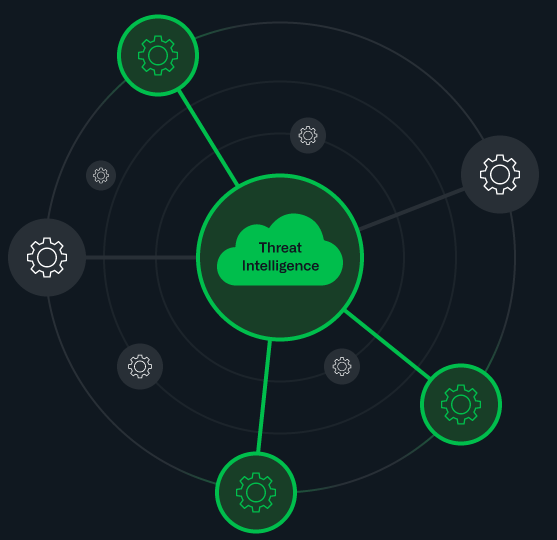
Infoblox Threat Intel
DNS All Day, Every Day
DNS is notoriously tricky to interpret and hunt from, but our deep understanding and unique access give us a high-powered scope to zero in on cyber threats.
What We Do
Infoblox is finding the threat actors hiding in your DNS
We are the leading creator of original DNS threat intelligence. We’re proactive, not just defensive, using our insights to track threat actor infrastructure and disrupt cybercrime where threat actors begin. We also believe in sharing knowledge to support the broader security community by publishing detailed research on select actors and associated indicators.
Threat actors discovered by Infoblox
Vextrio
Viper
Published: June 6, 2022
The longest running traffic distribution system (TDS) known in the industry with the largest number of criminal affiliates, brokering traffic for others while delivering malicious campaigns of their own.
Why is this special? First identification of a large-scale TDS discovered through DNS and the use of a dictionary domain generation algorithm (DDGA).
Decoy
Dog
Published: July 25, 2023
A nation state DNS C2 malware toolkit. Confirmed to be an advanced variant of Pupy RAT, Russian security vendors later claimed Decoy Dog was used to disrupt Russian critical infrastructure.
Why is this special? First discovery and characterization of a C2 malware solely from DNS.
Loopy
Lizard
Published: October 16, 2023
A phishing actor that steals credentials from consumers in Europe, the United States, and Australia using lookalike domains to financial institutions and government tax agencies. Formerly known as Open Tangle.
Why is this special? This is the first reporting of a dedicated lookalike domain actor.
Prolific
Puma
Published: October 31, 2023
A malicious link shortening service used by criminals to target consumers worldwide. This actor successfully overcame privacy controls for the usTLD before being exposed by Infoblox.
Why is this special? First description of a malicious link shortener in the industry.
Savvy
Seahorse
Published: February 28, 2024
A persistent investment fraud actor who leverages DNS CNAME records as a traffic distribution system (TDS) to control access to their malicious content spread through Facebook ads.
Why is this special? First description of the use of DNS CNAME records by threat actors to control and direct content for users.
Revolver
Rabbit
Published: July 17, 2024
A DNS actor using an advanced algorithm to create hundreds of thousands of domains for use in advertising campaigns.
Why is this special? Revolver Rabbit’s RDGA is prolific, varied, and exemplifies the challenge in discovering and determining the nature of networks designed to obscure actor operations.
Vigorish
Viper
Published: July 22, 2024
A Chinese organized crime syndicate that designed and operates a technology suite that is a full cybercrime supply chain: composed of software, Domain Name System (DNS) configurations, website hosting, payment mechanisms, mobile apps, and more.
Why is this special? This research connects numerous stories by journalists and human rights activists to a single organized crime network.
Horrid
Hawk
Published: November 14, 2024
A financially motivated threat actor has been hijacking thousands of domains since at least February 2023 for investment fraud schemes. These hijacked domains are embedded in short-lived Facebook ads targeting users in more than 30 languages across multiple continents.
Why is this special? The hijacked domains are taken over using the ‘Sitting Ducks’ attack vector and are utilized in every step of the actors’ campaigns.
How Infoblox creates original DNS threat intelligence
DNS Experts
We discover threat actors hiding in DNS because we know where to look. Starting with suspicious domains, we connect the dots and identify actor infrastructure, then begin tracking it as it evolves. Identifying new domains as they emerge so customers are continually protected.
Threat Expertise
We know how malicious actors operate and how malware, phishing, and other threats manifest in DNS. We’ve used this knowledge to develop specialized systems to detect lookalike domains, DNS C2 malware, registered domain generation algorithms (RDGAs) and suspicious behavior.
Data Science
We use machine learning and data science to analyze very large volumes of DNS queries every day to provide near-real time protection against data exfiltration, domain generation algorithms (DGAs), and a wide range of other threats.

Our threat intelligence powers
our security products
Disrupt cybercrime pre-incident with intel designed for DNS
BloxOne Threat Defense uses Infoblox Threat Intel to identify and stop threats before the rest of the industry.
Infoblox Security Products
BloxOne® Threat DefenseCybersecurity EcosystemAdvanced DNS Protection
About our Team
Eat. Sleep. DNS. Repeat.
What sets us apart? Two things: mad DNS skills and unparalleled visibility.
Featured articles
Krebs on Security | October 31, 2023
.US Harbors Prolific Malicious Link Shortening Service
Infoblox tracks a three-year-old link shortening service that caters to phishers and malware purveyors
TechRepublic | February 9, 2024
IT Pros Missing Mega-Threat From Organised Cyber Criminals
VexTrio threat actor delivers high volumes of malware to networks globally
Bleeping Computer | February 28, 2024
Savvy Seahorse Gang Uses DNS CNAME Records to Power Investor Scams
Savvy seahorse directs Facebook users to fake investment platforms to steal personal data






